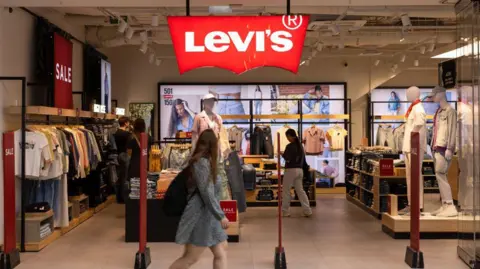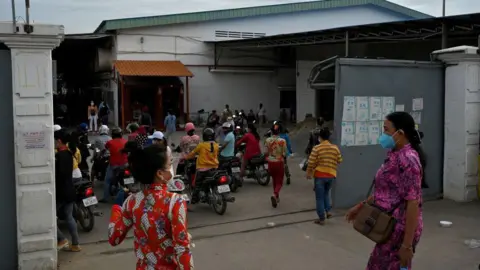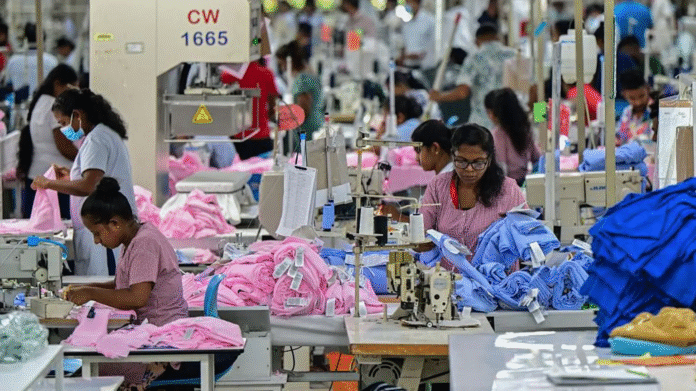Apparel hubs like Cambodia and Sri Lanka are heavily dependent on the US as an export market
Already living from hand to mouth, millions of garment workers across Asia fear for their jobs as a deadline to strike a trade deal with the US – or face punishing tariffs – looms closer.
On 9 July, following a 90-day pause on tariffs for countries to negotiate deals, the US president notified several countries in the region of new levies set to begin on 1 August. The new rates, while lower than those proposed in April, have done little to allay anxieties.
Among nations that received letters from Donald Trump were apparel hubs like Cambodia and Sri Lanka, which are heavily dependent on the US as an export market. The letters said that the two nations would face tariffs of 36% and 30% respectively.
Nike, Levi’s and Lululemon are among big-name US brands that have the bulk of their clothing made in these countries.
“Can you imagine what will happen if [we] lose our jobs? I’m so worried, especially for my kids. They need food,” says Nao Soklin, who works in a garment factory in southeastern Cambodia.
Ms Soklin and her husband Kok Taok make a living sewing bags for 10 hours a day. Together, they earn about $570 a month – barely enough to cover rent and provide for their two young sons and aged parents.
“[I want to] send a message to President Trump, to tell him to please lift the tariff on Cambodia… We need our jobs to support our families,” she told the BBC.
Cambodia, which has become a popular alternative to Chinese retailers because of its ready supply of low-wage labour, exported more than $3bn worth of apparel to the US last year, according to the Asean Statistics Division. The sector, which employs more than 900,000 people, makes up more than a tenth of the country’s overall exports.
For Sri Lanka, exports to the US helped the garment industry – which directly employs some 350,000 people – earn $1.9bn last year, making it the country’s third-largest foreign exchange earner.
“If [30%] is the end number, Sri Lanka is in trouble because our competitors, such as Vietnam, have received lower tariffs,” Yohan Lawrence, secretary general of Sri Lanka’s Joint Apparel Association Forum, told the Reuters news agency.
Last-ditch negotiations
Sri Lankan authorities are hopeful of negotiating a further reduction to the tariffs but have not disclosed what they would consider an acceptable rate.
Some of its leaders have noted that the country has received the highest concession – of 14 percentage points – so far as a result of earlier negotiations. “We see this as the beginning of a very good situation,” Secretary to the Finance Minister Harshana Suriyapperuma said last week.
Cambodia, which got a 13 percentage point concession, is also seeking further talks. “We are doing everything we can to protect the interests of investors and workers,” said Deputy Prime Minister Sun Chanthol, who leads the negotiating team.
“We want the tariff to be zero… But we respect their decision and will continue trying to negotiate a lower rate,” he said.

Trump says the tariffs are needed to reduce the gap between the value of goods the US buys from other countries and those it sells to them.
“Our relationship has been, unfortunately, far from Reciprocal,” the US leader wrote in letters to various countries last week, which he also posted on his Truth Social platform.
But analysts disagree.
Trump’s tariffs overlook the benefits that the US enjoys from existing trade agreements, including lower-priced clothing and higher profits for US companies sourcing from countries like Sri Lanka or Cambodia, says Mark Anner, dean at Rutgers’ School of Management and Labour Relations.
For decades, the US, European Union and Canada had in place a quota system that reserved a certain share of their markets for developing countries like Sri Lanka. The system, which was phased out in 2005, helped Sri Lanka’s garment sector flourish despite stiff competition.
“For the US to now impose prohibitive tariffs that effectively shut these countries out of the market goes against the very development path it once prescribed,” Prof Anner said.

It is unrealistic to expect small, developing economies not to run a trade deficit with the US, says Sheng Lu, a professor at the University of Delaware’s Department of Fashion and Apparel Studies.
“How many Boeing airplanes does Cambodia or Sri Lanka need and can afford to purchase each year?” he asked.
Asst Prof Lu believes the strategic rivalry between the US and China is also a factor in trade talks, given how these garment-exporting countries are integrated into supply chains that rely heavily on Chinese inputs.
They now have to “strike a delicate balance” between maintaining economic ties with China while also meeting new US demands, which may include cutting the use of Chinese inputs in production, he says.
Women bear the brunt
Washington’s tariffs add new pressures to familiar challenges in the industry: poverty and weak labour rights in Cambodia, and an ongoing economic crisis in Sri Lanka.
Women, who make up seven in 10 of garment workers in the region, are set to bear the brunt of the tariffs. More downward pressure on their already chronically low wages means their children could go hungry, while potential layoffs would be even more devastating.
Surangi Sandya, who works in a factory in the Sri Lankan town of Nawalapitiya, says she feels an axe hanging over her.
“Companies don’t work at a loss… If orders decrease, if there is a loss, there may be a possibility that the company will shut down,” she says. Ms Sandya started out as a rank-and-file seamstress in 2011, then worked her way up to become the supervisor of a 70-woman team.
If push comes to shove, some Cambodian workers say they will consider moving to Thailand to find jobs – even if they must do it illegally.
“Our livelihoods depend on the garment factory. We won’t survive if our boss shuts it down,” An Sopheak tells the BBC from her tiny 16 sq m room in Cambodia’s capital Phnom Penh.
“We have little education. We can’t find other jobs. We pray every day that President Trump will lift the tariff. Please think about us and our poor country.”
DISCLAIMER: The Views, Comments, Opinions, Contributions and Statements made by Readers and Contributors on this platform do not necessarily represent the views or policy of Multimedia Group Limited.
DISCLAIMER: The Views, Comments, Opinions, Contributions and Statements made by Readers and Contributors on this platform do not necessarily represent the views or policy of Multimedia Group Limited.


